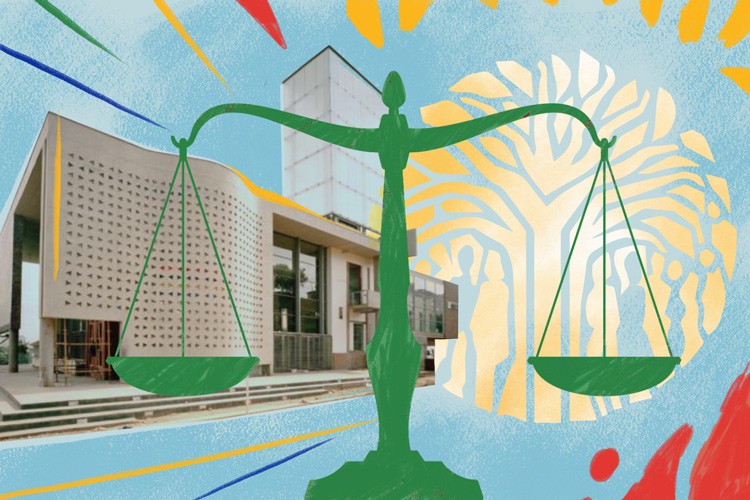
30 July 2021
Illustration: Lisa Nelson
The Constitutional Court on Friday ruled that an anti-gay column penned by the late broadcaster and ambassador Jon Qwelane was hate speech.
The unanimous ruling by the the apex court, overturned a previous decision in the Supreme Court of Appeal (SCA). The SCA had said that although Qwelane’s article, headed, “Call me names, but gay is not ok”, was strident and provocative bigotry, it still fell within the realm of freedom of expression.
The article, carried in the Sunday Sun in 2008, led to a flood of complaints to the South African Human Rights Commission (SAHRC), which instituted legal action, initially in the Equality Court.
The Constitutional Court has now ruled that the SCA was wrong, and the fact that Qwelane had died in December last year, did not mean the issue was “moot”.
“The complaint that the rights of the LGBT+ community had been infringed is alive and must still be adjudicated,” Judge Steven Majiedt said in judgment handed down on Friday.
“In unequivocally aligning himself with former Zimbabwean President (Robert) Mugabe’s abominable statements, his article unabashedly exuded his loathing and revulsion.
“Homophobic speech is part and parcel of the broader system of homophobia and transphobia in South African society … It contributes to an environment that serves to delegitimise their very existence and their right to be treated as equals,” said the judge.
Judge Majiedt said hate speech regulations ought to be grounded in the express anti-racist and anti-sexist tenets of the Constitution.
He said Qwelane had “significant stature” and influence, and had clear intent to instigate hatred against the community and “it was difficult to conceive a more egregious assault” on the dignity of LGBT+ people.
“There can be no question that his statements constituted hate speech.”
The other issue before the court was the ruling by the SCA that the Promotion of Equality and Prevention of Unfair Discrimination Act (PEPUDA), generally known as the Equality Act, was “vague and overbroad”. This was especially so because PEPUDA went much further than the Constitution in also outlawing speech that was “hurtful”.
On this point, the Constitutional Court agreed and it has given Parliament 24 months to rectify the defect in the Act.
Judge Majiedt said the issue had been a “delicate balancing exercise between the fundamental rights to freedom of expression, dignity and equality”.
The SAHRC had argued that while the section of the Act infringed on the right to freedom of expression, the limitation was reasonable and justifiable, in light of the right to dignity.
Judge Majiedt said on a plain reading the Act was broader than the Constitution, as it included the term “hurtful” and made “sexual orientation” a protected group.
“Sexual orientation” is not included in the Constitution under the freedom of expression section that prohibits “advocacy of hatred that is based on race, ethnicity, gender or religion, and that constitutes incitement to cause harm”.
The judge said “sexual orientation” should be added to the list of protected groups as “it would not be possible to protect the rights of the LGBT+ community without prohibiting hate speech based on sexual orientation”.
The SCA had therefore read in “sexual orientation” and the Constitutional Court agreed.
On the issue of hate speech, the Judge said it was the antithesis of values envisioned by the rights of free speech, but it should be emphasised that the expression of unpopular or even offensive beliefs did not constitute hate speech.
“A healthy democracy requires a degree of tolerance towards expression or speech that shocks or offends.
“There is no universally accepted definition of the term. It would appear that it travels beyond mere offensive expression and can be understood as ‘extreme detestation and vilification which risks provoking discriminatory activities against that group’.
“Expression will constitute hate speech when it seeks to violate the rights of another person or group of persons based on group identity. It does not serve to stifle ideology, belief or views.
“The purpose of hate speech regulation in South Africa is inextricably linked to our constitutional object of healing the injustices of the past and establishing a more egalitarian society.”
Judge Majiedt said expressions that were “merely hurtful”, as opposed to harmful, did not constitute hate speech and any prohibition “sets the bar rather low” and cannot be justified.
The judge said the section of the Act was “irredeemably vague and did not pass constitutional muster”, in that ordinary citizens would have difficulty knowing whether their conduct could be considered “hurtful or harmful”.